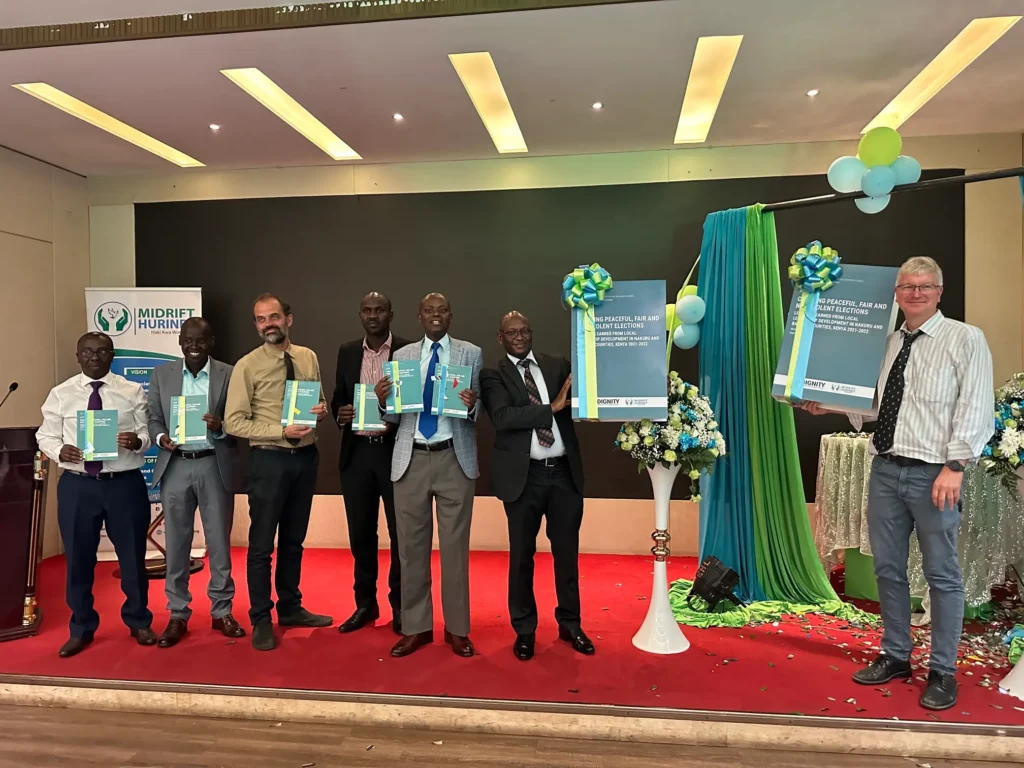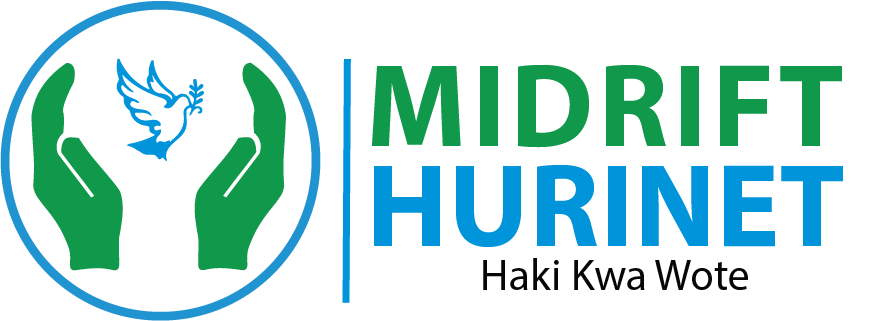From Opponents to Allies:
Breaking the Cycle
of Violence in Kenya
From Opponents to Allies: Breaking the Cycle of Violence in Kenya
For over 50 years,
Kenya’s elections have been marred
by violence and conflict.
However, the 2022 elections marked a significant shift in the Nakuru region, where former opponents united to foster dialogue and reduce violence.
This initiative is now set to expand throughout Kenya amid ongoing protests across the country.
KENYA
For over 50 years, Kenya’s elections have been marred by violence and conflict. However, the 2022 elections marked a significant shift in the Nakuru region, where former opponents united to foster dialogue and reduce violence. This initiative is now set to expand throughout Kenya amid ongoing protests across the country.
Text and photo: Marie Torp Christensen
Illustration and layout: Marie Friis
Confetti is falling in the hotel’s conference room, which is decorated in green and blue colours. On stage, a few handfuls of people are smiling at the participants.
Among those smiling the widest is Joseph Omondi.
Joseph Omondi, the director of DIGNITY’s partner organisation in Kenya, MIDRIFT HURINET, is among those beaming with pride. They have just released a report, marking the 2022 elections in Kenya as the most peaceful in the country’s history.
The report by two renowned Kenyan researchers is the culmination of decades of work to break the cycle of violence in the Nakuru region, where several areas have been dominated by election-related violence and unrest since 1992.
»We initiated discussions on what a peaceful election could look like even before the election campaigns began,« says Joseph Omondi.
»Our goal has been to create communities equipped with both knowledge and practical tools to prevent violence, driven by the hundreds of trained community leaders.«
Since 2016, MIDRIFT HURINET has trained 570 community leaders. They include representatives from the police, the Ministry of Education, the media, powerful voices in the community and elected officials.
Together, through 10 modules, they have worked with themselves, their impact on the community, learnt what creates conflicts and how to solve them. Together, this has given them a shared language and understanding that they use to make their neighborhoods safer and have reduced the violence.
Joseph Omondi is the Director of DIGNITY’s partner organization in Kenya, MIDRIFT HURINET.
A History of Division
It’s hard to ignore division and violence when telling the story of Kenya’s democracy. The country has more than 42 different ethnic groups, the three largest of which are the Kikuyu, Luhya and Kalenjin.
The ethnic groups often have a history of conflict, co-operating and supporting and promoting different political candidates.
In 2007 and 2008, post-election violence reached an all-time high with more than 1,100 people killed, 650,000 internally displaced and six people, two of them candidates, charged with crimes against humanity at the International Criminal Court in The Hague (ICC).
It was in the wake of the 2007 elections that Joseph Omondi with a desire for justice and change founded the organization MIDRIFT HURINET to fight violence in Kenya.
»I was motivated by ensuring justice for the victims of violence. If the victims don’t get justice, the violence repeats itself again and again. Violence becomes normalised,« he says.
In June 2024 the government’s tax hikes sparked mass protest across the country, which further illustrated, that there still is a crucial need for dialogue.
»Young people are demanding that politicians broaden their vision. It’s essential for the country to unite peacefully,« says Joseph Omondi.
Bridging Divides
Divisions are not new in Kenya; they have shaped its history for generations, particularly among ethnic groups with a history of conflict and differing political beliefs.
It is this divide that MIDRIFT HURINET seeks to address in their work, where through violence prevention education, participants come together in teams and collaborate across sectors and affiliations.
The work also aims for the participants to understand each other’s perspectives so they can build relationships that impact the rest of the communities.
»Initially, participants struggled to engage with one another due to lack of trust and perceived differences,« says Joseph Omondi, who has seen how the programme’s 10 modules of 1.5 days each over a period of six months, organised as development workshops, have changed both the participants and their relationships with each other.
»It’s amazing to see how they are now working together to change their communities and are living proof that co-operation, coexistence and peace are possible.«
Expanding Horizons
Initially, MIDRIFT HURINET focused mainly on the areas of Baringo Central, Baringo South, Tiaty East, Tiaty West, Njoro, Naivasha, Nakuru Town West and Nakuru Town East, as these are violence-prone areas.
Autumn of 2023 marked a new chapter, as the organization completed the first workshops in Kenya’s capital Nairobi, and it won’t be the last.
Following the summer protests, the Kenyan government has partnered with MIDRIFT HURINET to implement violence prevention strategies nationwide.
»This is an important milestone – not just for us at MIDRIFT HURINET, but for the whole country,« says the director.
»We can clearly see the change that our violence prevention programmes are making for those living in areas where we are working.«
It’s not just Joseph Omondi who can see the difference. Patrick Mutahi, one of the two researchers assigned to document the impact of MIDRIFT HURINET’s work, believes that the approach has been crucial.
»They have brought together actors from civil society, the state and the media, which is a new method and a different way of working with the challenges. The wide range of participants is crucial for the great impact the programmes have.«
»In my estimation, there is definitely scope for the programme to expand to other parts of Kenya and make a difference far beyond Nakuru’s borders,« concludes Patrick Mutahi.
As the celebration concludes and confetti settles, the commitment to creating a safer Kenya continues.
The goal remains clear: to foster peace during elections and throughout daily life.

Research. On the release day of the report ‘Creating Peaceful, Fair and Non-violent Elections’, which was prepared by two renowned Kenyan researchers.
MEET THOSE WHO FIGHT VIOLENCE AND BUILD BRIDGES FOR PEACE
Ben Ouko from Nairobi
Silas Rotich from Nakuru
FACTS:
HOW DIGNITY AND MIDRIFT HURINET WORK TOGETHER
In Nakuru, DIGNITY works with the organization MIDRIFT HURINET to prevent violence in local communities, train local health workers in psychological first aid and PM+, and build trust between citizens and authorities in promoting local leadership.
DIGNITY has been working with MIDRIFT HURINET in Kenya since 2014. The work is supported by the Danish Ministry of Foreign Affairs.
Read more about how we reach 250 people a month with psychological first aid →


FACTS:
FROM GUATEMALA TO KENYA
The basic idea for the violence prevention programs that MIDRIFT HURINET is developing in Kenya with DIGNITY originated in Guatemala. That is where DIGNITY and the Research Centre for Violence Prevention in Central America (CIPREVICA) developed the methods to prevent violence.
DIGNITY actively ensures that our partners across countries and sectors learn from each other and develop together. Therefore, there has been a strong collaboration between MIDRIFT HURINET and CIPREVICA over the years, just as there is also a collaboration between MIDRIFT HURINET and organizations in both Sierra Leone and Liberia in West Africa.